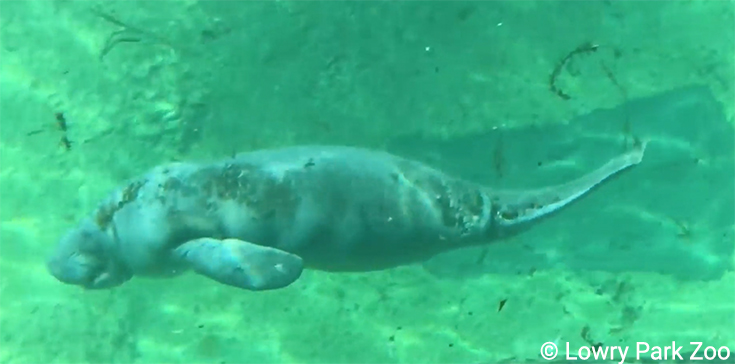The Saddest ‘Emoji’ of All
Published by Ocean Conservancy
 Emoji – “a small digital image or icon used to express an idea, emotion, etc., in electronic communication.”
Emoji – “a small digital image or icon used to express an idea, emotion, etc., in electronic communication.”
But for veterinarians and staff at Lowry Park Zoo in Tampa, Florida, Emoji was so much more.
Emoji was a two-week old orphaned Florida manatee that was found 15 pounds underweight when Zoo staff rescued him separated from his mother in October. Despite being underweight, Emoji was found with a full belly. Unfortunately, it was plastic bags and debris that filled its stomach, while other trash protruded out the back side of Emoji’s digestive system.
For three months, staff at Lowry Park Zoo provided Emoji top notch care and worked to rehabilitate the manatee. In spite of their heroic efforts however, Emoji finally succumbed to its injuries this past Monday.
Dr. Ray Ball, a senior veterinarian at the Zoo, noted that it’s not unusual for manatee calves to ingest plastics and other debris. And sadly, this tragic event is not an uncommon occurrence in our global ocean. It’s estimated that 52% of the world’s remaining sea turtles have eaten plastics and 62% of sea birds have plastics in their guts. Whales that wash ashore dead have been discovered with massive accumulations of fishing nets and other debris in their stomachs, and increasingly widespread contamination of plastics in fish and shellfish is being documented by scientists.
“Now more than ever, we must hold ourselves accountable, whether that’s keeping trash and plastics out of our waterways or being more mindful of potential consequences of propeller strikes on wildlife while boating,” said Ball.
We are saddened by Emoji’s story. But, here at at Ocean Conservancy we try very hard to make sure stories like these become fewer and fewer by working every day to stop plastics and debris from entering the ocean. We continue to work very closely with Loggerhead Marinelife Center and other sea turtle organizations to keep trash off nesting beaches and help monitor trends in the trash collected.
For 32 years, Ocean Conservancy’s International Coastal Cleanup (ICC), has helped keep trash off our beaches and out of the ocean! Volunteers from states and territories throughout the U.S. and more than 150 countries come together each year and participate in an ICC event on their local beach or waterway. Three decades of Cleanups have yielded more than 220 million pounds of trash being collected and saved from polluting our ocean, thanks to the extraordinary efforts of over 12 million volunteers.
Reading stories like this one of Emoji may make you feel sad and helpless—but there are actions in your daily lives that you can take to help make a positive difference in the community around you. You can take the ocean oath—and join Ocean Conservancy. It’s our goal to generate 100,000 actions during the first hundred days President Trump is in office.
So while it may seem tough at the moment, we can all celebrate Emoji by committing to a clean and healthy ocean free of trash for generations of humans and manatees to come.
Read the full article at: http://blog.oceanconservancy.org/2017/02/03/the-saddest-emoji-of-all/


